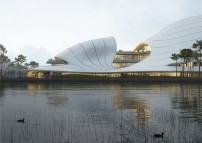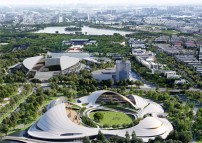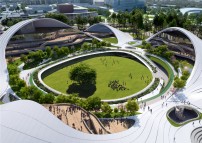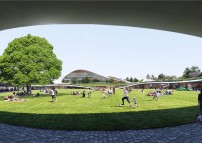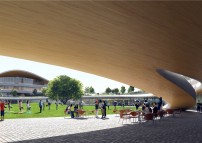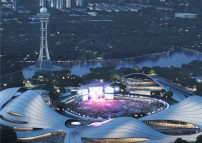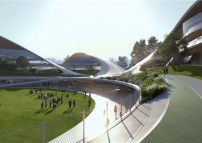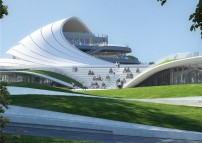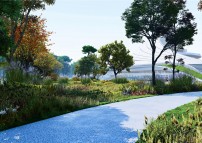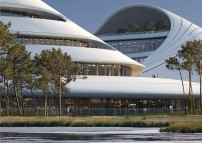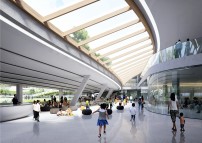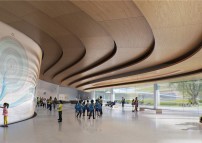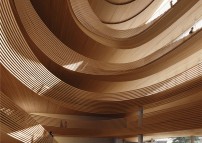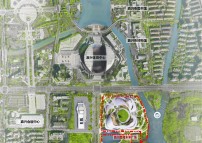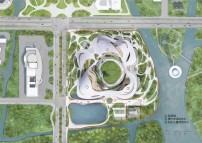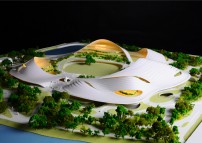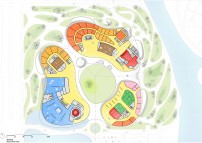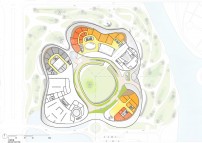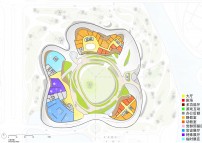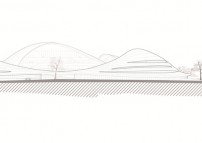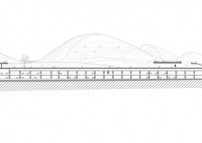MAD, led by Ma Yansong, has released their design for the Jiaxing Civic Center. The scheme marks the latest important public project in Jiaxing City designed by MAD, after their design for the Jiaxing Train Station was unveiled earlier this year. Holding elegant river views and lush vegetation, the Jiaxing Civic Center is situated along the city’s central axis. The project holds a prominent position; adjacent to the South Lake, a historic lake in the South of Jiaxing, and the Central Park, the largest park in the city. The site also lies next to the Haiyan river channel that connects the two cities of Jiaxing and Haiyan. Spanning approximately 130,000 square meters, the site contains three venues: the Science and Technology Museum, the Women and Children Activity Center, and the Youth Activity Center, forming a total construction area of 180,000 square meters and a site footprint of 72,000 square meters.
“A civic center, first and foremost, must be a place that attracts people; a place where children, youth, seniors, and families are willing to come together on a daily and weekly basis. We have created an undulating ring to serve as a garden-like living room for the city: an embrace.”
– Ma Yansong
For the Jiaxing Civic Center, MAD has designed an artistic entity on an urban scale; where architectural forms and landscapes fuse together. With a large circular lawn as the centerpiece, the project is one where both people and buildings can interact and share; forming a more open, intimate, dynamic new urban space. The center’s three venues are linked together “hand in hand,” enclosed by a circular roof to form a single entity. The organic flow of the lines throughout the project echoes the softness and grace of the ancient canal towns lining the southern banks of the Yangtze River in Eastern China. The central circular lawn that anchors the buildings allows for the large architectural volumes to dissipate and dissolve into the landscape. Adjacent to the South Lake, the waterfront building sits within the central park, covered with locally produced white ceramic panels. The panels respond to the traditional barrel tile roofs of the local village, while also enhancing the scheme’s economic and energy efficiency. Meanwhile, the project’s floating roof forms a continuous skyline, like a tarp blown by the wind, bringing a soft sense of wrapping to the form. Whether you are on the central lawn, outside the park, or on the building’s links and pathways, the scenery seems to change with your movement.
To maintain the cohesiveness of a single entity, the three venues serving exhibition, education, and amenity functions are all coherently arranged under the curvaceous roof, naturally forming an interdependent group with a flowing line of movement. The spaces for exhibition, theater, education, activity, entertainment, and other uses are organically weaved together to complement one another. By avoiding the wasteful duplication of service spaces, the design offers more space for people and nature, and enhances the building’s energy-saving attributes. The 6,000-square-meter lawn becomes a new type of urban public space, where every citizen can gather, rest and play, in addition to participating in a variety of activities or visiting exhibitions.
The first floor of the center has connections to the surrounding environment on all sides, through bordering the municipal traffic and wider landscape, or connecting the central lawn with the parklands on the periphery of the building. This semi-open, semi-private space can be used in a variety of ways, whether for daily activities, or as an open-air plaza for large urban cultural events. In addition to the central green space, the scheme contains additional open and intimate spaces connecting people to the outdoors, and to nature. Among these, the terrace on the second floor of the site creates a 350-meter-long landscape corridor and running path. The public can climb towards the track from the central green space to walk or exercise, or visit the amphitheater and sunken plaza on the east side, before wandering into the parkland forest beyond the center to enjoy the wilderness.
The original trees on the site that have grown to an impressive age are preserved as much as possible, informing the design of the landscape to form a new natural park. In the middle of the green forest are winding paths and passages through the enclosed buildings, where one can walk through the trees and enjoy the riverfront view. A cascading terrace, facing the central lawn in the interior of the building, acts in a dialogue with the white curved roof. The elements interlock and overlap into multiple semi-outdoor spaces, separated by minimalist floor-to-ceiling glass, blurring the interior and exterior. This is an urban public space for citizens to gather; a fresh, pure land for people to wash away the city’s complex clutter.
Jiaxing has a unique historical status in China. The vision for MAD’s scheme, embracing innovation, coherence, environmental friendliness, openness, and co-sharing, resonates with the historical heritage of this city, making this municipal public building a place that enhances the citizens’ sense of belonging and happiness. By exploring the relationship between the city, nature, and humanities, MAD aims to create an urban space that is accessible to all, offering natural, equal, and friendly open spaces to everyone in the city. Here, architecture allows citizens to envision a spiritual blueprint of their ideal life in the fast-paced world, and to gain a sense of the promising future to be created through the positive development of the city.
Jiaxing Civic Center has completed its bidding for engineering procurement construction, and is expected to be completed by the end of 2023.
Jiaxing Civic Center
Jiaxing, China
2019 – 2023
Typology: Civic, Musuem
Site area: 126,740 sqm
Building area: approximately 180,000 sqm
Above ground: 72,351 sqm
Underground: 107,950 sqm
Height: 39 m
Principal Partners: Ma Yansong, Dang Qun, Yosuke Hayano
Associate Partners: Kin Li, Fu Changrui, Liu Huiying
Design Team: Yin Jianfeng, Alessandro Fisalli, Fu Xiaoyi, Chen-Hsiang Chao, He Yiming, Thoufeeq Ahmed, Chen Hao, He Xiaowen, Zhang Yaohui, Guo Xuan, Edgar Navarrete, Claudia Hertrich, Deng Wei, Zhang Xiaomei, Chen Nianhai, Li Cunhao, Sun Feifei, Punnin Sukkasem, Manchi Yeung, Li Yingzhou
Client: Jiaxing Highway Investment Co., Ltd.
Executive Architects: East China Architectural Design & Research Institute, Shanghai Municipal Engineering Design Institute (Group) Co., Ltd.
Façade consultant: RFR Shanghai
Landscape Consultant: Earthasia Design Group, Yong-High Landscape Design Consulting Co.Ltd
Interior Design consultant: Shanghai Xian Dai Architectural Decoration & Landscape Design Research Institute CO., Ltd
Signage Consultant: Nippon Design Center, Inc.
Lighting Consultant: Beijing Sign Lighting Industry Group
Traffic Consultant: Shanghai Municipal Engineering Design Institute (Group) Co., Ltd.
